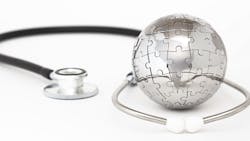In addition to showcasing the best athletes from around the globe, the Olympics also can serve as a unique breeding ground for germs. All those spectators who descend into London this summer will be coming from around the world – and might be bringing more with them than their entry tickets, experts say.
Whenever you’re in a venue with hundreds of thousands of people gathering – whether at a professional sporting event, a large concert or other major public event – you run an increased risk of being exposed to germs. If the attendees are from all over the world, like at the Olympics, that risk only grows, said Mayo Clinic infectious diseases expert Gregory Poland, M.D. In those cases, the people around you may not have the same immunization programs or the same standards of personal cleanliness or food safety, he explained.
“The big ones that we’re worried about in terms of the Olympics are things that are currently epidemic in certain parts of the world, including the U.S. Those would include pertussis, measles, mumps, rubella, and of course, when you have people coming from the Southern Hemisphere, this is their influenza season,” said Poland, who is the Mary Lowell Leary Professor of Medicine and director of the Vaccine Research Group at Mayo Clinic.
Other heightened dangers in places with large numbers of people passing through include respiratory diseases such as tuberculosis; vermin such as head lice and bedbugs; food-borne sickness such as E. coli, salmonella, hepatitis A and traveler’s diarrhea; and skin conditions including athlete’s foot and staph infections.
Poland offers these tips for sidestepping illness when in large crowds:
Keep your vaccines up to date. The most important vaccines include the MMR vaccine for measles, mumps and rubella; the seasonal flu shot; and a relatively new vaccine called Tdap, for tetanus, diphtheria and acellular pertussis. Vaccination against pertussis, also known as whooping cough, is particularly important as epidemics spring up around the United States and the world, Poland said. England and other parts of Europe also have had measles outbreaks, he added.
Wash your hands thoroughly with soap and hot water or alcohol-based hand sanitizer, particularly before leaving a restroom, eating or touching your face. Wash your hands for about 20 seconds, roughly as long as it takes to sing “Happy Birthday.” When visiting a public restroom, use a paper towel to turn off the faucet and open the door when leaving, to avoid recontaminating your hands with the plethora of germs on public faucets and door handles.
Dine carefully. If it’s not cooked well, boiled or peeled, forget it. Seek out food that requires little handling when prepared. Make sure food that is supposed to be hot is served hot and food that is supposed to be cold is served cold, and make sure dishes and utensils are clean.
Tread safely. Wear shower shoes/pool shoes when using the shower or pool in public places.
Swim smart. Avoid swimming pools, hot tubs or whirlpools unless you are certain they are properly maintained. It’s particularly hard for consumers to tell whether a hot tub or whirlpool is sanitary, and if it is not, bacterial, skin and pulmonary infections are a danger, Poland said.
Don’t smoke. It raises the odds you’ll get Legionnaires’ disease if you’re exposed to the legionella bacteria, and can also make you more susceptible to respiratory illnesses in general.
Use your head. Don’t try on hats in stores. To minimize the risk of getting head lice, if you buy a hat, seal it in a plastic bag to carry it home, then freeze it for several days or launder it before wearing.
Don’t let the bedbugs bite. Scout for bedbugs before taking a hotel room. Once in a room, only place your luggage on wooden surfaces or in the bathtub, not on the floor, bed, chair or couch until you determine whether bedbugs are present.
Be an advocate for your health. If someone near you is obviously ill, move away if you can, or ask to be reseated. If a server’s hands touch your food or the rim of your glass or cup, don’t be embarrassed or hesitant about asking for a new serving or moving on and eating elsewhere.
And if you are or recently have been at a mass gathering such as the Olympics and aren’t feeling well, seek medical attention.
“If you do develop signs of illness, you need to be evaluated,” Poland said. “You don’t know if it’s a simple virus, a complicated virus, bacteria, or even unfortunately, with this many people from around the world, something of greater concern such as tuberculosis.”
But don’t let a fear of germs spoil your fun, either. Poland points out there’s no need to take precautions to an extreme, such as wearing a face mask in public, unless you are ill or there is a known epidemic.
During these Olympics, let’s hope the only epidemic is a rash of gold medals.
About the Author

Laura Walter
Laura Walter was formerly senior editor of EHS Today. She is a subject matter expert in EHS compliance and government issues and has covered a variety of topics relating to occupational safety and health. Her writing has earned awards from the American Society of Business Publication Editors (ASBPE), the Trade Association Business Publications International (TABPI) and APEX Awards for Publication Excellence. Her debut novel, Body of Stars (Dutton) was published in 2021.
